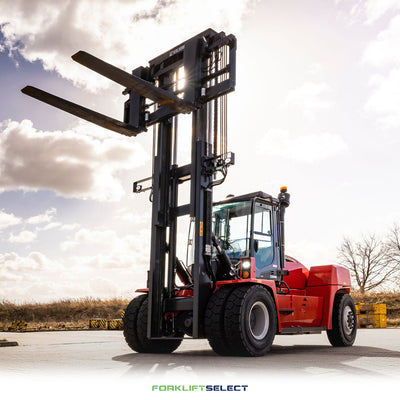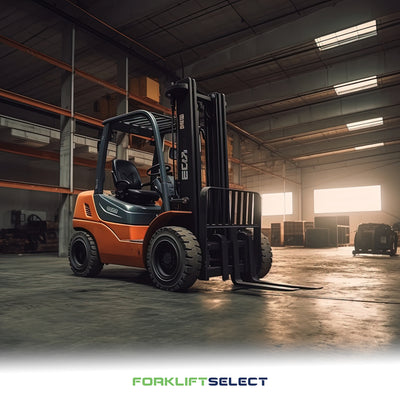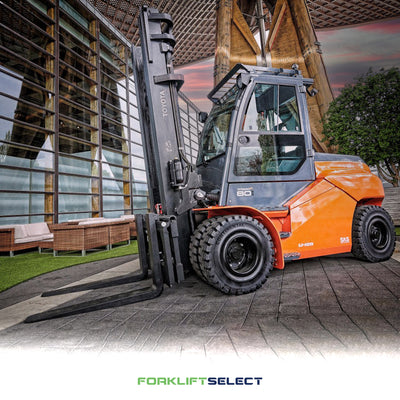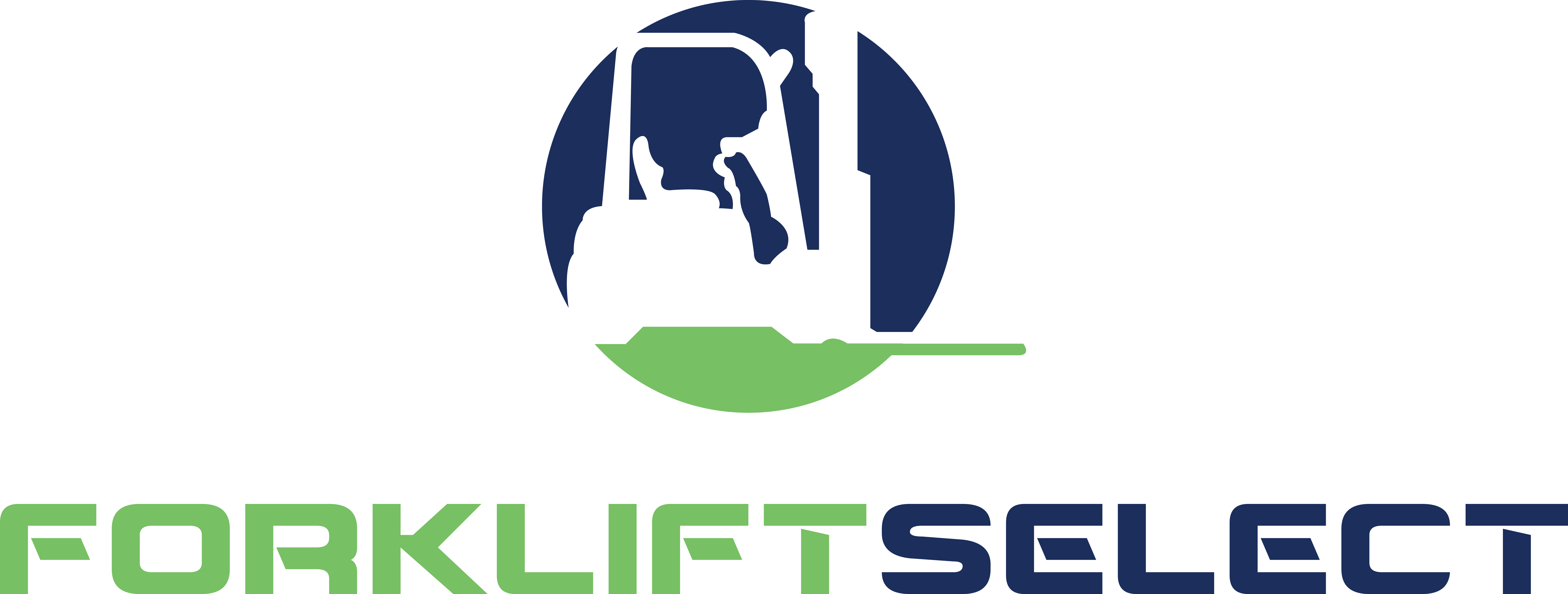FREQUENTLY ANSWERED QUESTIONS
Choosing the right equipment for your needs can be confusing especially if you’re not familiar with the different types of forklifts out there. We want to help you make the best choice for your business. Below you’ll find common forklift questions to keep in mind when looking for a lift.
Do you have a loading dock or need to go into a shipping container or trailer? The answers to these questions will affect the size, lifting capacity and maneuverability of the forklift you need.
Is the area well ventilated? Are there concerns with explosive material or environments? Are you in a warehouse where employees need to be lifted to break bulk and select merchandise? Do you move heavy loads in uneven terrain? Is it temperature controlled? How much room do you have to move around in? All these concerns factor into what forklift will be the best fit for your needs.
Height and load size determines the capacity of a forklift needed. For example, a larger load size will move the lift´s center of gravity which reduces the lifting capacity.
Is it smooth and level or rough and uneven? If you work outdoors or on uneven surfaces you’ll want a pneumatic tire on your forklift or you may need to look for a rough-terrain lift. Rough terrain lifts are equipped with additional suspension capability and are generally wider than the standard forklift. This provides a more stable work platform with a lower center of gravity.
Deciding what you want for options will depend on your needs versus luxury.
- Side shift
- Fork positioner
- Attachments
- Fork Length
Common Questions About Forklifts
There are many types of forklifts, and each serves a specific need. Choosing the right lift for the job can make a big difference in how efficient and productive your company operates. With many factors to consider before buying or leasing a forklift, review some common questions below to see what type of forklift is right for you. If you still aren’t sure what is right for your needs, one of our material handling experts is happy to assist you! You can also check out our Forklift Information page and Types of Forklifts page for even more helpful information!
There are many types of lifts for a multitude of tasks. Here at Forklift Select, we carry 17 different types of lifts. Take a look at our Types Of Forklifts page to find out more about each type of lift, and to see a photo of each.
Class 1: Electric Motor Rider Forklifts
These lifts are electric-motor rider trucks. Trucks in this class may have 3 or 4 wheels with cushion (solid) or pneumatic (air-filled tires. Includes both sit down and stand up types.
Class 2: Electric Narrow Aisle Forklifts
These lifts have electric-motor and are used for narrow aisle or inventory stock/order picking applications. They have solid tires. This class includes reach and deep (double) reach trucks as well as order selector trucks which are also known as “order pickers” or “cherry pickers.” Other narrow aisle trucks include stand up straddles, swing masts, sideloaders and turret trucks.
Class 3: Electric Hand Pallet Jacks or Walkie/RiderJack Forklifts
Electric or hand-powered pallet jacks are primarily used for loading and unloading trailers and for short horizontal material handling. Low lift electric hand pallet jacks are also known as “walkies.” They have solid tires. They use pallet forks or a platform to haul loads several inches off the ground.
Class 4: Internal Combustion Engine (ICE) Cushion Tire Forklifts
Traditional lifts powered by either liquid propane gas(LPG), compressed natural gas (CNG) or gasoline and used primarily indoors.
Class 5: Internal Combustion Engine (ICE) Pneumatic Tire Forklifts
Traditional lifts powered by either liquid propane gas (LPG), compressed natural gas (CNG), gasoline or diesel fuel and used primarily outdoors.
Class 6: Electric and Internal Combustion Engine Tractor Forklifts
These lifts are sit-down riders or tow tractor forklifts and are supplied with electric or internal combustion engines. Solid or pneumatic tires.
Class 7: Rough Terrain Forklift Trucks
These lifts have pneumatic tires and are almost exclusively powered by diesel engines and used outdoors on rough terrain. Typical applications include agriculture, logging and construction.
Internal Combustion Forklifts
- Operate on gasoline, diesel, compressed natural gas or liquid propane gas
- Primarily used outdoors, limited indoor use under certain circumstances
- Able to operate in various conditions
- No batteries to recharge
- Some can lift over 50,000 pounds
- Lifespan depends on application, use and how you maintain it
- Noise emissions meet or exceed ANSI B56.1 Standards
Electric Forklifts
- Typically less maintenance than an IC forklift
- An IC forklift produces louder emission compared to an electric forklift.
- No fuel-storage required
- A charging station is necessary
- Batteries are large and heavy to change out.
- Unlike IC engines, it produces absolutely no tailpipe emissions.
- Lifespan depends on application, use and how you maintain it
- Better option for smaller, confined spaces
- Load capacity from 3,000 to 12,000 lb. capacity
Cushion Tires:
Cushion tires, also known as solid tires, are made of a solid rubber compound and do not contain air-filled chambers like pneumatic tires. These tires have a smooth, solid construction, providing a high level of durability and resistance to punctures. They are commonly used in indoor environments with smooth surfaces such as warehouses and manufacturing facilities. Cushion tires offer a compact design, making them ideal for tight spaces and smaller forklift models. However, they may provide a slightly less comfortable ride compared to pneumatic tires, especially on rough or uneven terrain.
Pneumatic Tires:
Pneumatic tires are air-filled tires, similar to the ones used on regular vehicles. They are constructed with a rubber outer layer and contain air-filled chambers, which act as shock absorbers. Pneumatic tires offer superior traction and cushioning, making them suitable for outdoor use on various surfaces, including gravel, asphalt, and uneven terrain. Forklifts equipped with pneumatic tires provide a smoother ride and better handling over bumps and obstacles, enhancing operator comfort and reducing the risk of load damage.
Key Differences:
The main difference between cushion and pneumatic tires lies in their construction and application. While cushion tires are solid and best suited for indoor use on smooth surfaces, pneumatic tires have air-filled chambers and are well-suited for outdoor applications, especially on rough or unpaved terrain. The choice between cushion and pneumatic tires depends on the specific working environment and the type of tasks the forklift will be performing.
There are 3 main types of fuel for running a lift: Gas, Diesel and Electric. It’s a common misconception that the only major differences between fuel types are: cost of forklift, operating costs and environmental impact. Of course, both cost and environmental impact certainly play a big part in making the right decision on which fuel type is right for the material handling equipment your business will be using. But the fuel type you need could depend entirely on the kind of business you run.
LPG (Liquid Propane Gas) Forklifts
Gas forklifts are the most common type of forklift.
Pros: They are easy to refuel, low maintenance and have a longer life span. They are ideal for outdoor application and indoor with adequate ventilation.
Cons: Limited power and require a propane tank to provide fuel.
Electric Forklifts
Electric forklifts are ideal for smaller warehouses and facilities.
Pros: Can be used in a non-ventilated closed environments and are quiet when operating.
Cons: Downtime when you need to recharge the machine and intermittent use can be detrimental to battery life.
Diesel Forklifts
Diesel forklifts are very powerful.
Pros: Low upkeep, easy to fuel and reliable.
Cons: Has emissions and are noisy. Exclusively for outdoor use.
- Do you need to stack materials?
- Will the forklift be used indoors or outdoors and what will the environment be like?
- What types of materials will you be moving with the forklift?
- How much is a typical load weight that you will be moving?
- What is your maximum rack height?
- What is the maximum lift height?
- What capacity forklift do you need?
- What is the width of the aisles the forklift has to go through?
- How often will you be using the forklift?
Our team of forklift experts are always on hand to answer your questions, contact us today!
Forklifts are essential investments for businesses, but their cost varies based on factors like lifting capacity, power source, brand, and features. Consider upfront expenses, ongoing maintenance, and overall ownership costs to make an informed decision. Explore used forklifts and financing options if necessary. Choose wisely to boost productivity and efficiency in your operations.
Yes, we do! Find out more about our forklift financing. It’s fast and easy!
Shop with the Forklift Expert!
Speak with a Specialist
Unsure where to start? Our knowledgeable industry specialists are available to guide you into the right forklift for your business.
Testimonials
Forklift Select, LLC's is the best. Great customer service, communication and follow through. I purchased a refurbished forklift through, I'm totally satisfied with the experience. The delivery setup and delivery driver were also a good experience as well.
I have worked with many forklifts and equipment company's in the past and Forklift Select has been the easiest and the fastest to get it done. They got it to my location within 2 days. Everything was as they said it would be. The company and there staff are as Top Notch as it gets. 5 Stars in our book. Thanks Guys!
I have worked with many forklifts and equipment company's in the past and Forklift Select has been the easiest and the fastest to get it done. They got it to my location within 2 days. Everything was as they said it would be. The company and there staff are as Top Notch as it gets. 5 Stars in our book. Thanks Guys!





 (877) 733 - LIFT
(877) 733 - LIFT





